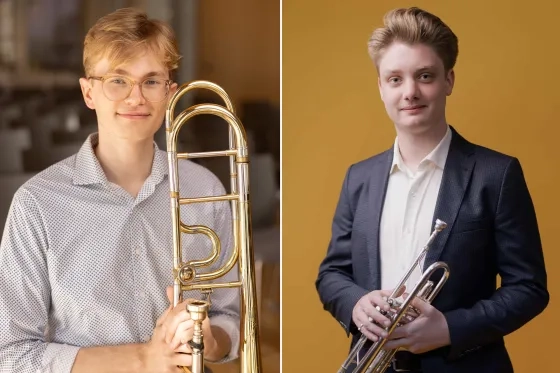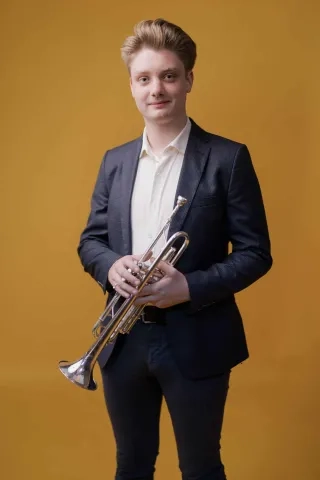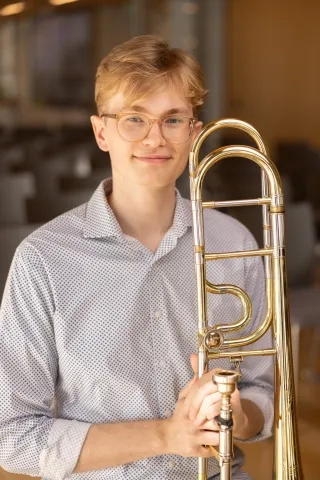Brass Goes to Washington: SFCM Grads Score Jobs with NSO and Army Field Band
Michail Thompson (trumpet, '23) and Nate Berry (trombone, '24) are headed to Washington, D.C. Here, they share their stories and tips for such high-profile auditions.
Next thing you know, SFCM will have an embassy building there.
Conservatory alumni Michail Thompson (trumpet, '23) and Nate Berry (trombone, '24) each won high-profile jobs in the nation's capital: Thompson will be playing second trumpet with the world-renowned National Symphony Orchestra, while Berry has secured a trombone slot in the U.S. Army Field band.
"We are all so proud of Michail for winning this major position," Thompson's teacher at SFCM, Adam Luftman, said. "His hard work and thoughtful artistry during his time at SFCM was a model for all students."
"While I was at SCFM, I ended up taking lessons or studying in some capacity with all of the members of the section that I'm about to join," Thompson reveals. "I visited the National Orchestral Institute in Maryland a few years ago, and met William Gerlach [Principal Trumpet of the NSO] and took a lesson with him and played for a masterclass with Michael Harper [Assistant Principal Trumpet]. I also managed to get a lesson with Tom Cupples, who was the previous second trumpet in the NSO. So we were at his house playing, and I would have never imagined that in three years time, I'd be sitting in his chair in the orchestra. It's a story that, if I'm lucky enough to teach in the future, I'll be telling my students to inspire them."
Berry first became aware of the opportunity with the Field Band—known as "the musical ambassadors of the Army"—when their brass quintet visited SFCM. "The Brass Department brought them into our chamber class and they told us they had auditions coming up," he explained. "After they heard my group play, they said, 'We like the way you play: Come out and audition.'"
Berry was part of a group of 16 or so musicians auditioning on his particular day at Fort Meade in Maryland outside D.C., which began at 9 a.m. ("The Army likes to start early," he added.) Following the third round, Berry interviewed with the band commander and the head of staff where the job was laid out to him. "Essentially the Field Band tours around and gives concerts to the people of America," he says. "It really connected with me. I'm someone who's always really enjoyed going around and playing for younger kids trying to get them started in music. So the Field Band is more about serving people and trying to connect with kids in high schools and middle schools, rather than strictly serving an ensemble. There's three or four tours a year, totaling, I think, about 96 days of touring per year at the most."
Berry, who had a trombone quartet at SFCM, is especially excited about the opportunities with the trombone section of the band. "One of the guys told me, 'Make sure to show up with all your trombone quartets. The playing level in that trombone section and in the band is just incredible. In the section round, I was blown away by the sounds, and it made me just super excited to get to work with them."
Thompson had some intimidating placements when it came to auditions. "I played last in the preliminaries, number 77 out of 77," he said. "At first it really freaked me out, but I realized the worst thing that can happen in an audition is to be forgotten, and the first and last don't get forgotten. So I had an opportunity to be remembered. Then in the semi-finals, I was 13 out of 13. I walked on stage and the personnel manager who walked me out said, 'Lucky number 13.' And then in the finals, I went first.'"
Berry and Thompson both shared their approaches to such an intimidating audition.
"A lot of what I was focusing on going in was mental," Berry said. "I focused a lot on being insanely confident that I had done the practice, that I was ready for this opportunity. and the only thing that could hold me back was me. So I spent a lot of time meditating, going through my affirmations, getting myself in the right mental headspace to perform at the highest level. And immediately, as soon as I stepped out of each round, I was focusing on preparing for the next round, getting myself in that headspace of, 'It doesn't matter what just happened. I'm going forward."
Thompson said, "I made a really conscious mindset change about a week before this audition. For every other audition I've taken, I would go into it thinking I needed to be the best trumpet player. I needed to impress the judges. And that puts a certain pressure on you to play everything perfectly in a way that they will like, which inherently takes the music out of your control and puts it into the committee's control. But you haven't met them, you don't know what they like. For this audition, I tried to be so excited and trusting in my playing that every person behind the committee would want to take their instrument out of their case and come join me on stage. That took things from a negative mindset into a positive one, because I was in control of making something that I thought was very exciting happen and trying to be inclusive by wanting them to come join me."
Both players—who had run into each other at regional orchestras in the Pacific Northwest before arriving at SFCM—are excited to start their new jobs, though Berry, unlike Thompson, has to go through basic training first.
"After I won the audition," Berry said, "I called a handful of SFCM professors, and they all picked up and were excited and supportive and happy for me. And I couldn't have even gotten close to where I was without the help of my private teacher Tim Higgins."
Thompson echoed the thanks to his teacher. "Adam had me play second trumpet to him a lot. In LA and in the San Francisco Opera, I got to play second and third trumpet there. One of their comments from my audition was that I sounded like someone who had already done the job quite a lot, and it's just because of all the experience I got playing in ensembles around the Bay."
Learn more about studying trombone, trumpet, or brass at SFCM.


